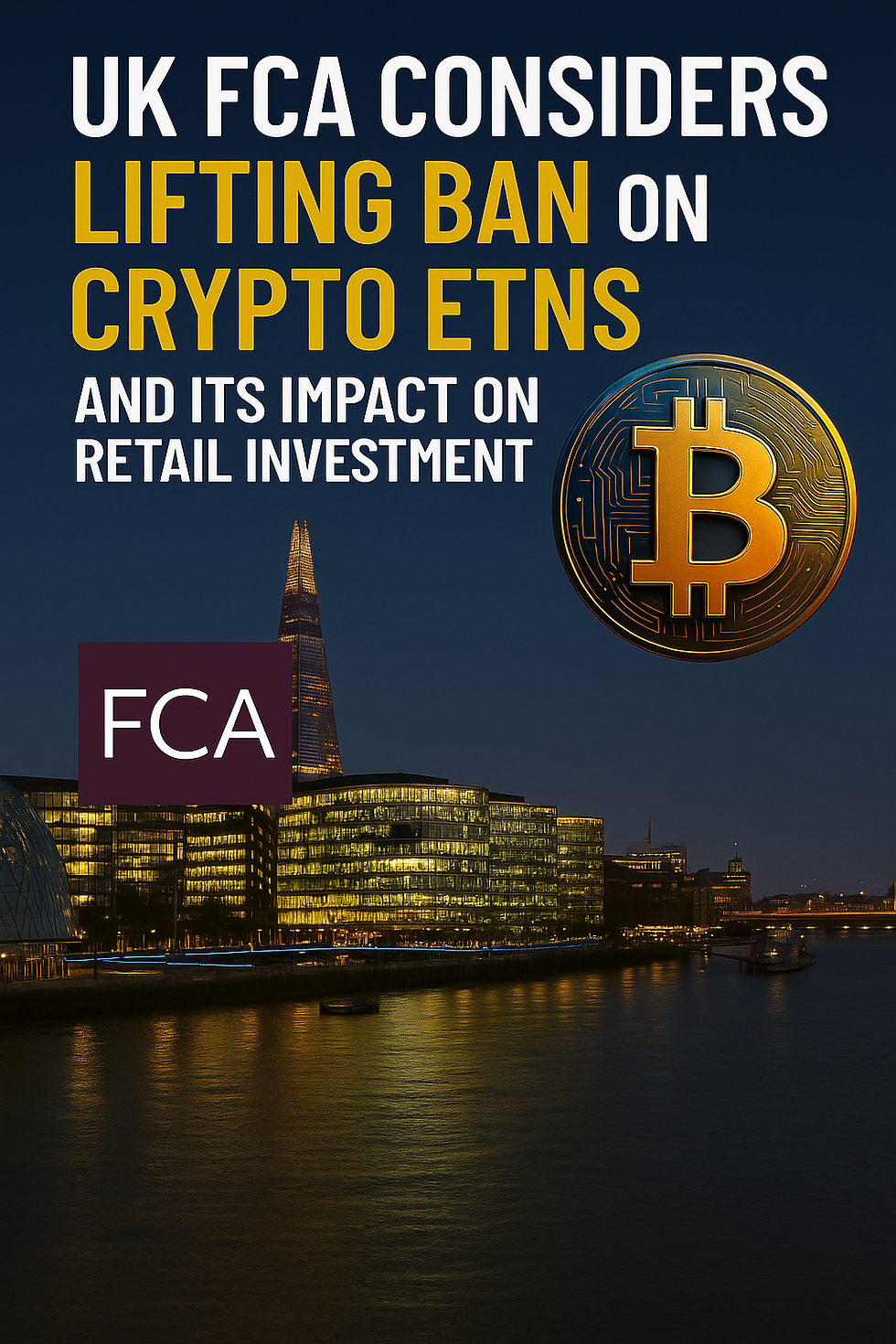UK FCA's Potential Move to Lift Ban on Crypto ETNs and Its Impact on Retail Investment
- BlocBerg
- Jun 6
- 4 min read

The UK Financial Conduct Authority (FCA) is considering lifting its longstanding ban on cryptocurrency exchange-traded notes (ETNs) aimed at retail investors. This decision could drastically change the crypto investment landscape in the UK, affecting both market dynamics and retail investors' experiences. With the crypto world continuously evolving, the FCA's initiative demonstrates the need to balance innovation with consumer safety.
In this post, we will explore the context behind the FCA’s proposal, examine its potential impact on retail investors, and discuss the overall implications for the UK’s competitive position in the global crypto market.
Context of the FCA's Current Stance
The FCA imposed its ban on crypto ETNs primarily to protect consumers from the high risks associated with cryptocurrency investment. The crypto market is notorious for volatility, with prices of leading cryptocurrencies like Bitcoin and Ethereum fluctuating significantly. For example, Bitcoin surged to an all-time high of nearly £50,000 in 2021, only to drop below £15,000 in late 2022. Such drastic changes highlight the grave risks involved in trading cryptocurrencies.
As the crypto sector has matured and educational resources have become more widespread, discussions about lifting this ban are gaining traction. The FCA acknowledges the importance of evolving regulations to keep pace with the changing landscape of technology and investor demographics.
What Are Crypto ETNs?
Understanding cryptocurrency exchange-traded notes (ETNs) is essential before exploring the implications of the proposed ban lift.
ETNs are unsecured debt securities issued by financial institutions that track the performance of a specific index, commodity, or asset class. In the case of crypto ETNs, these products offer investors an easy way to gain exposure to various cryptocurrencies without the need to directly hold them. This can serve as a more regulated and potentially safer option compared to direct investment in cryptocurrencies.
Nevertheless, crypto ETNs are not without risks, including the volatility of the underlying digital assets. A market downturn, such as when the total market capitalization of cryptocurrencies fell by over 70% in 2022, can significantly impact these investment vehicles.
Enhancing Competitiveness in the Crypto Sector
One of the main reasons for the FCA’s proposal to lift the ban is to improve the UK’s standing in the global crypto ecosystem. Countries like Canada and Australia are already embracing cryptocurrency-related financial products. If the UK continues to impose restrictions, it could risk becoming less competitive, potentially discouraging innovation and investment.
By opening the doors to crypto ETNs for retail investors, the FCA could foster a more inclusive financial environment. This could allow individuals to diversify their portfolios and participate in the growing digital economy. Furthermore, enhancing accessibility sends a positive signal to global investors, potentially attracting more firms to establish operations in the UK.

The Investor Protection Dilemma
While there are many potential benefits to lifting the ban, the FCA faces significant challenges in ensuring investor protection. It is essential to have a solid framework that addresses risks associated with introducing crypto ETNs.
Investor education should be a priority. The FCA needs to ensure that retail investors are informed about the nature and risks of crypto ETNs. This could involve initiatives aimed at enhancing consumer knowledge about market trends and best practices. For instance, regular workshops or online seminars could help potential investors understand how to analyze the crypto market.
Retail Investors: What’s at Stake?
Lifting the ban on crypto ETNs could unlock numerous opportunities for retail investors looking to diversify their portfolios. Many investors may have shied away from direct cryptocurrency investments due to concerns about security breaches and price volatility. By offering a safer means of entry, the FCA can democratize access to this asset class.
However, access also comes with responsibility. Retail investors must be diligent in educating themselves about market dynamics, risk factors, and sound investment strategies. Engaging with well-researched content or consulting financial advisors are steps investors should consider to navigate this new landscape effectively.
Global Context and Future Outlook
The discussions around lifting the ban on crypto ETNs must be viewed in the broader international context. Countries like the United States, with over $3 trillion in cryptocurrency trading volume in 2021, and Switzerland have established clear regulatory frameworks for crypto investment products. The UK should strive to create a balanced approach that fosters innovation while ensuring robust consumer protections.
As the UK considers its regulatory path, aligning its policies with global best practices can help reinforce its reputation as a responsible player in the crypto space.
Final Thoughts
The FCA's examination of lifting the ban on crypto ETNs for retail investors marks a crucial moment not just for regulation, but for the future of cryptocurrency investments in the UK. The potential advantages include increased access to the market and enhanced competitiveness. However, safeguarding investor protection remains vital.
As we enter this new financial era, collaboration among stakeholders is essential to develop a framework that promotes innovation while prioritizing the safety of retail investors. The path ahead may pose challenges, but continuous communication among regulators, investors, and industry participants will be key to nurturing a sustainable and effective crypto ecosystem.




Comments